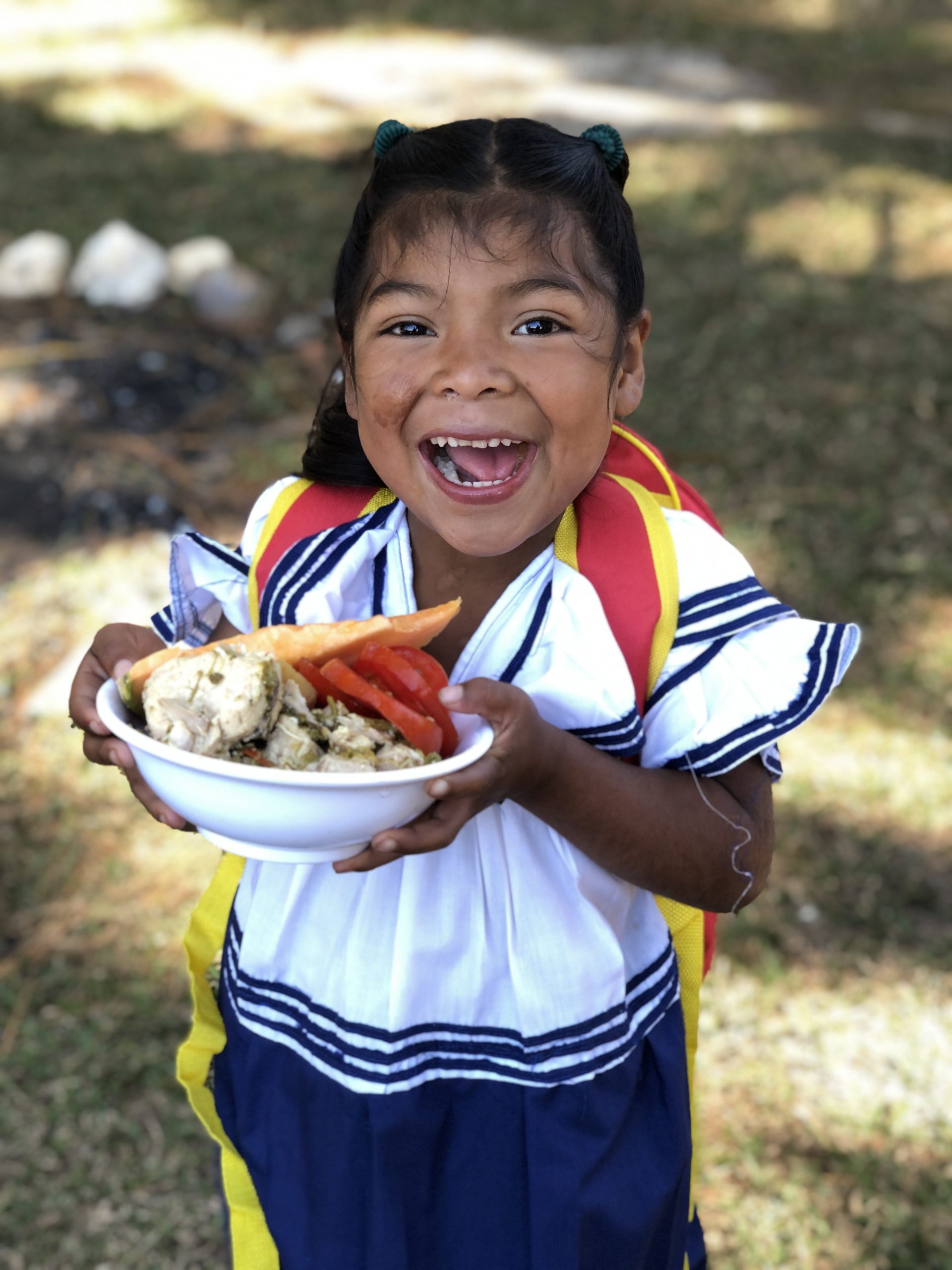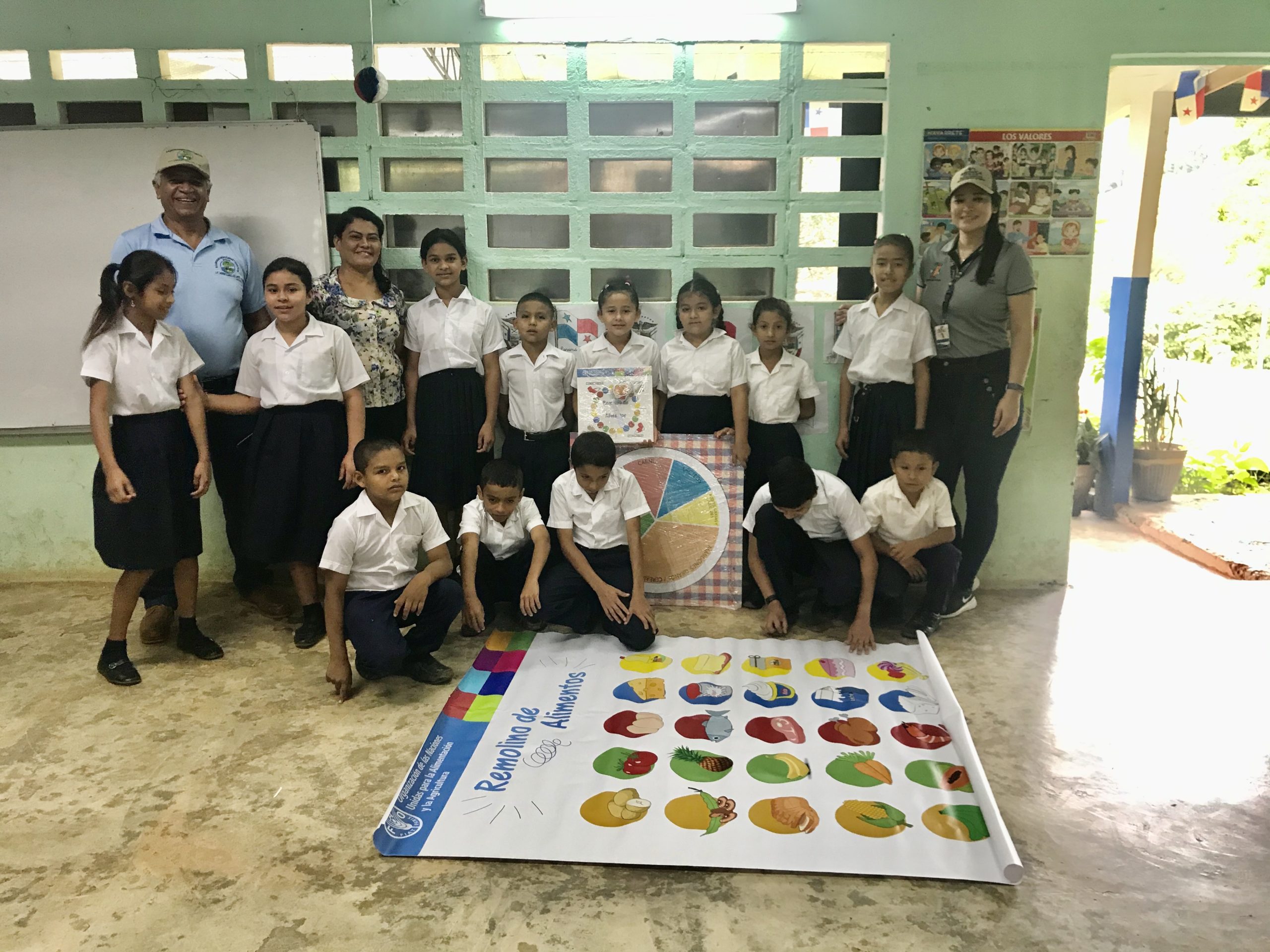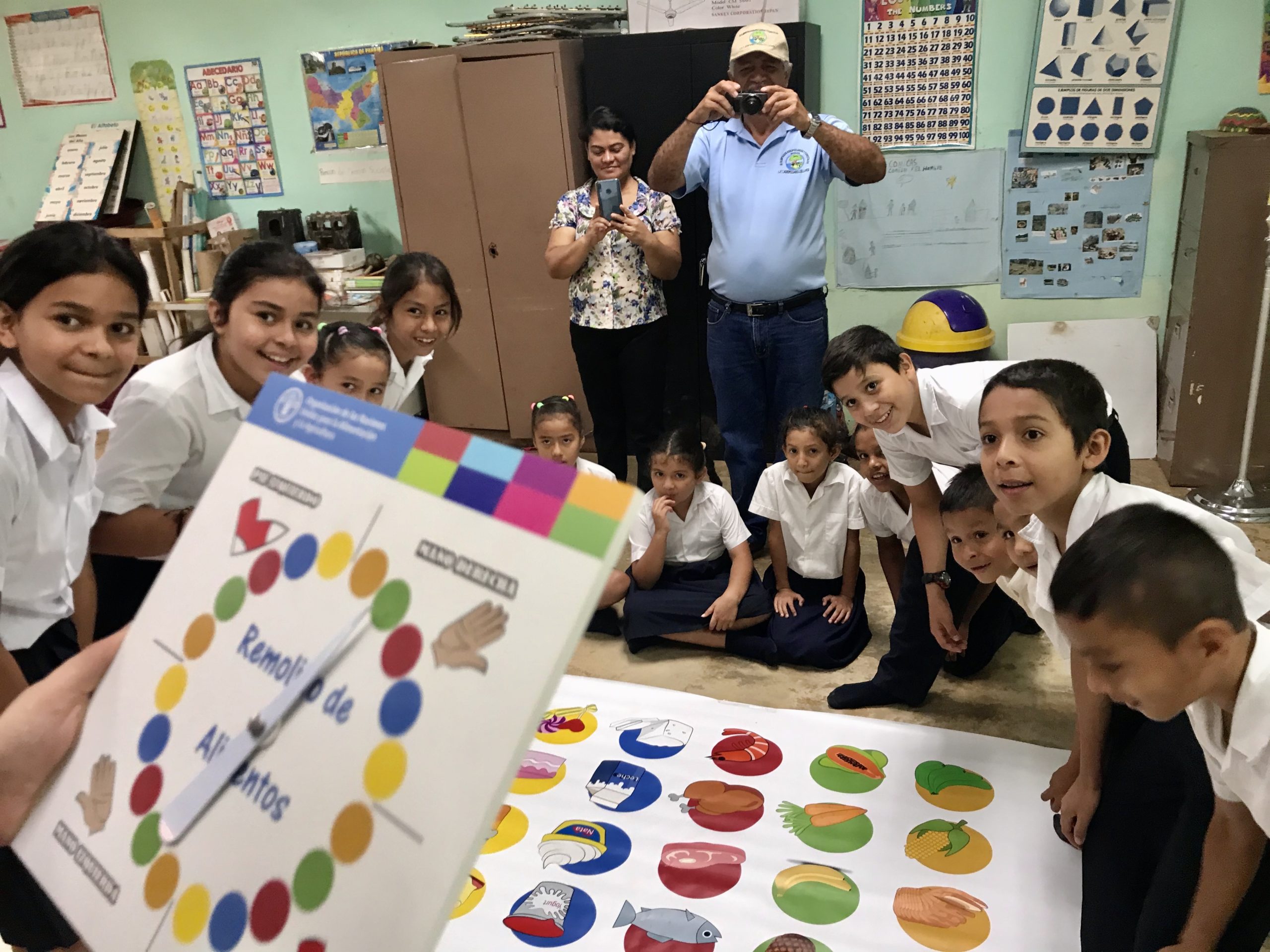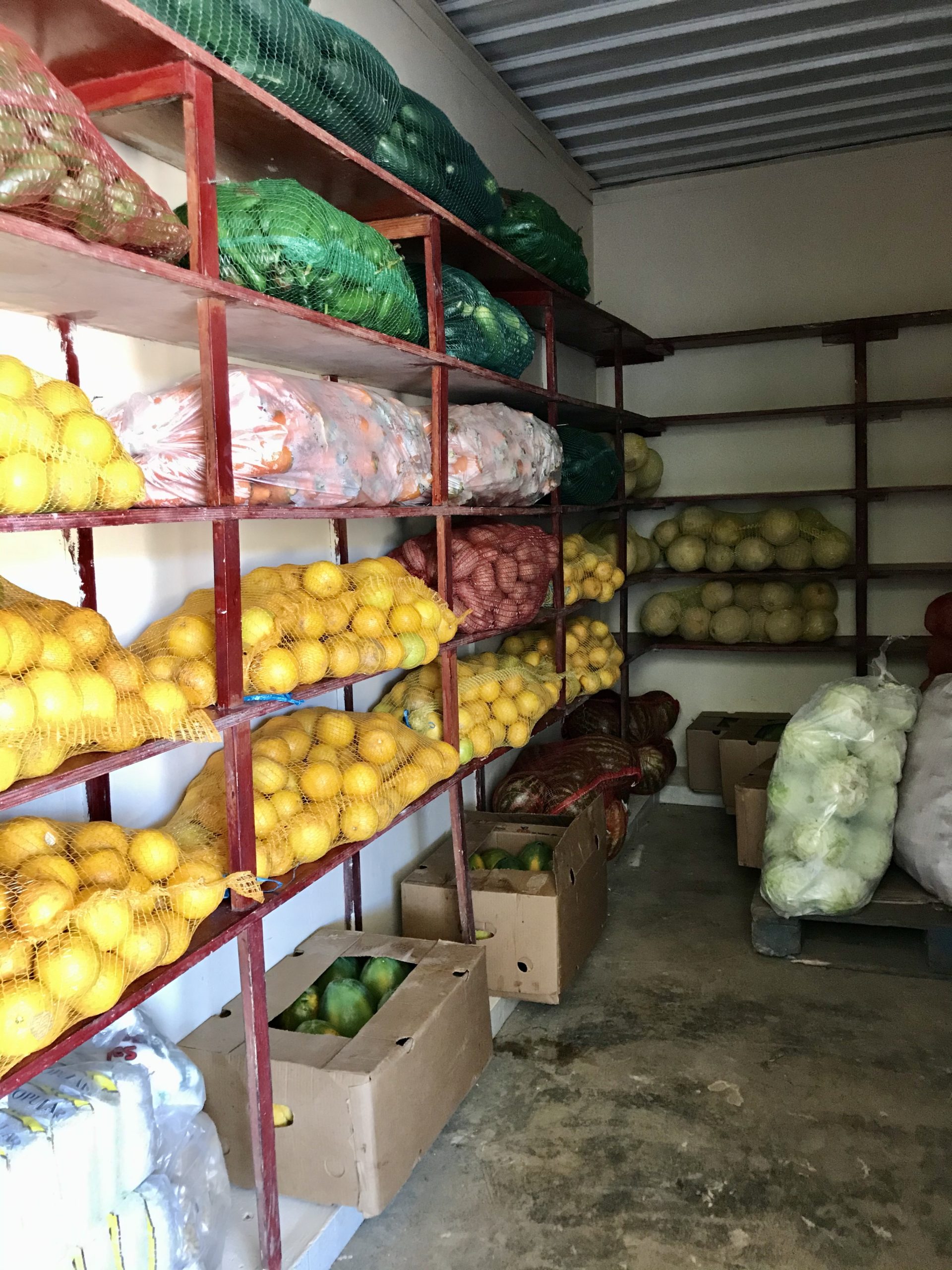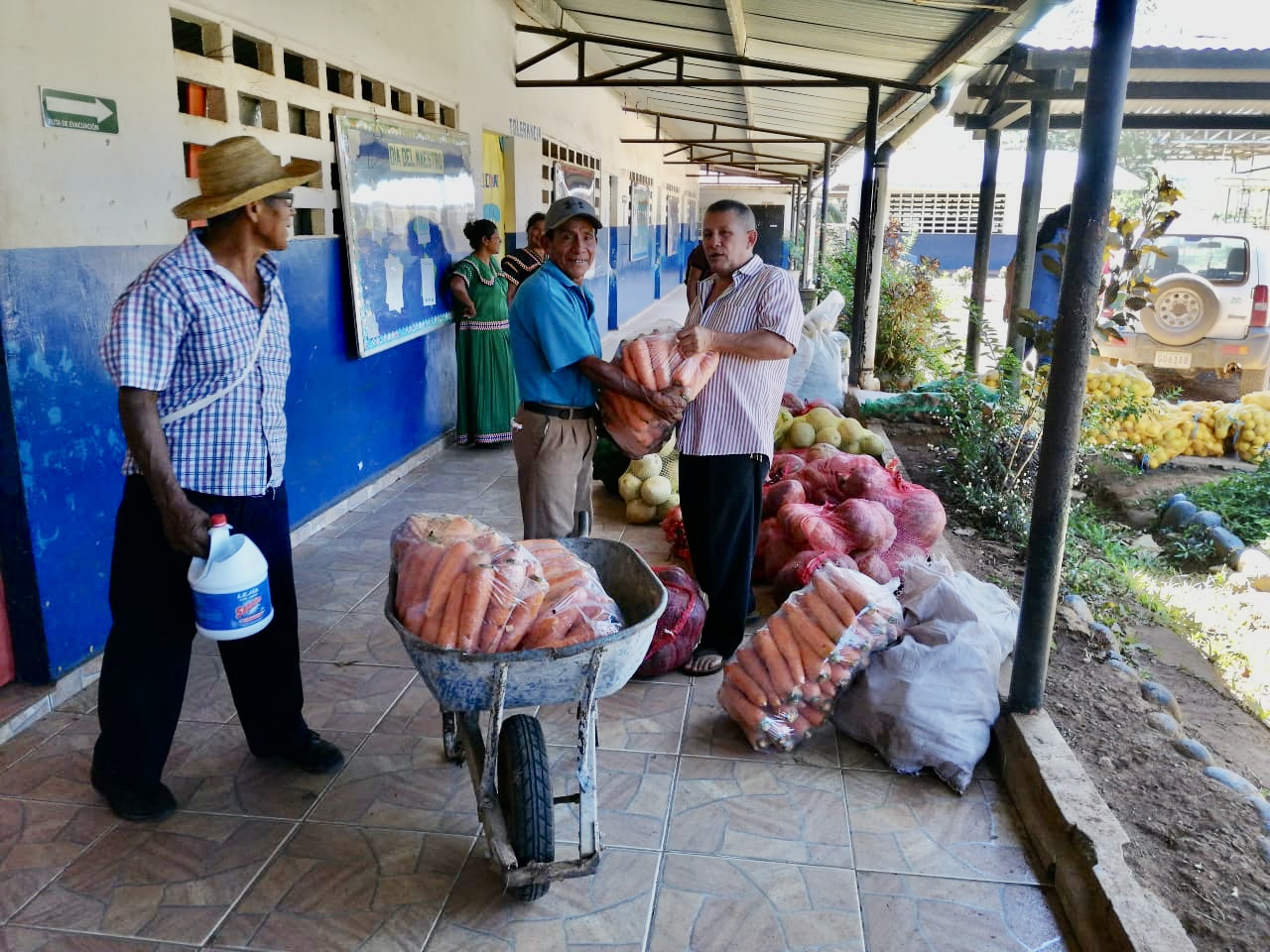Background
In the last semester of 2019, the Government of the Republic of Panama, through the Ministry of Education, and the United Nations Food and Agriculture Organization (FAO), joined efforts to review, adjust and manage the transition from the School Feeding Program (SFP) to a viable intersectoral articulation Program based on the “Sustainable Schools” methodology called “Study without Hunger”.
This program focuses on the children’s right to adequate food and nutritional improvements in educational centers in urban (neighborhoods), rural, and county areas; and it is aligned with the national guidelines on healthy eating “Food-Based Dietary Guidelines” (FBDG).
This is how the Study Without Hunger Program begins. It was inaugurated with the start of the school year in March 2020, in the four representative schools of the areas mentioned before. It was articulated and implemented with the Ministries of Health (MINSA by its Spanish acronym), Ministry of Social Development (MIDES by its Spanish acronym), and Ministry of Agricultural Development (MIDA by its Spanish acronym).
The program, which was successfully developed during the first weeks of March and reached more than 2,400 children, was paused because of the closure measure established by the State with the presence of the COVID-19 pandemic.
Despite the school’s closure, Study Without Hunger continued to function in two major areas of action that were: first, the development of food and nutrition education training for teachers; and second, the execution of the infrastructure adaptation of dining rooms and kitchens that were deteriorated because of the non-use.
During the third quarter of the school year in 2021, the reactivation of the program’s other activities and components was carried out with the semi-attendance return to classes. In this way, direct public purchases from family farming allowed schools to stock up on healthy food; such as fruits and vegetables, as well as other natural and nutritious ingredients, to offer a healthy and varied diet to girls and boys.
The recent 115 law created and institutionalized the Study without Hunger program. This law reforms the SFP by offering a plate of hot and healthy food that provides adequate nutrition to students in the country’s official schools. As part of the implementation plan and with the support of 115 law; the Ministry of Education started scaling up the process, taking as a reference the most vulnerable villages in the country.
During the years 2021 and 2022, FAO and the Government of Panama, through the Ministry of Education, developed actions in favor of reaffirming the commitment to the right to adequate food, health, and education for children. It also contributes to the 2030 agenda with the fulfillment of SDG1 (poverty), SDG2 (zero hunger), SDG3 (health), and SDG4 (education), and it sustainably improves the nutritional conditions of the school population in the Republic of Panama.
Developed activities
Considering the context and the installed capacities of the country, the activities that were carried out during the pilot phase of the “Studying without hunger” program were planned with the interagency coordinating team. These activities were aligned with the six components of the “Sustainable Schools” model.
The activities included a survey of the program baseline, revision and validation of the menu proposal, infrastructure adjustments and improvements, development of capacities in FNE, elaboration of didactic tools, identification and selection of producers, technical follow-up in schools, and development of documents and reports.
Baseline
Before the implementation, an initial diagnostic study was carried out in four schools that participated in the pilot. The schools were selected by the Ministry of Education and represented the different scenarios (Urban, rural, and county areas) required by MEDUCA.
A representative sample of 660 children from 4 to 18 years old, belonging to the four schools, was calculated: 183 from the Amelia Denis De Icaza School, 182 from the Llano Tugrí School, 240 from the Llano Ñopo School, and 55 from the Quebrada del Rosario School. Information was collected on the socio-environmental, demographic, nutritional food situation and knowledge, attitudes, and behaviors concerning the health and nutrition of schoolchildren. The main results are shown in the following infographics:
Infrastructure improvements
The infrastructure improvements took place with diagnostic visits to the pilot schools, identifying the needs of each school, taking special consideration of the food storage, preparation, and delivery areas; thus programming the different adaptations in the kitchen, dining room, and storage areas. These adaptations were coordinated in conjunction with the regional directives of MEDUCA and the directors of each school, with the consent of the Ministry of Education.
This component also contemplated the equipment provided for the cold chain maintenance, dining room, and kitchen furniture and utensils, equipment for the preparation and consumption of food; as well as the adequacy in painting, cleaning, and fumigation of the areas mentioned before.
Menus adequate, healthy, and appropriate to the local culture
The activities are aimed at the development of a suitable and healthy menu proposal, that is adapted to the local cultural context and in line with Panama’s FBDGs. The proposal was agreed upon and validated by the MEDUCA, MINSA, and FAO nutrition teams, for the scenarios in urban, rural, and county areas. The proposal added to the supply of grains already established by the MEDUCA school feeding program, and vegetable and protein rations preferably acquired locally with the corresponding minimum sanitary measures. The team agreed that the proposal would be aligned with:
Food and Nutritional Education (FNE)
A training program was designed with an FNE approach, it was prepared by a team of nutritionists from the MEDUCA regions where the schools and FAO were located. Also, there was coordination with the teachers of the courses of family and community development, natural sciences, and agriculture, among others. The topics developed focused on the promotion of nutritional well-being, food, healthy habits, and lifestyles. This training program was aimed at teachers, students, parents, and cooks.
The preparation of FNE didactic tools was also contemplated. These tools aimed to promote healthy eating habits and healthy lifestyles in schoolchildren. These tools will support the teachers’ activities and teaching planning. On the other hand, this component also included the promotion of school gardens as a pedagogical tool.
Family farming for school feeding
These activities were carried out in coordination with the MIDA. The ministry led the identification, support, and monitoring of family producers and farmers who could cover part of the food demand established in the proposed menu.
Applied methodology
According to Panama’s context, the methodology used for the design and implementation of the Program was adapted from the Sustainable Schools (SS) model. This methodology was based on the six components of the SS: school meals as a human right, provision of healthy and adequate food, Food and Nutritional Education, universalization, social participation, and territorial development. This methodology establishes a reference for the sustainable implementation of school feeding programs.
Additionally, this methodology has been highlighted in the countries where it has been replicated and scaled, developing capacities, exchanging experiences, and disseminating materials and information. Especially the activities that were emphasized were the involvement of the educational community, the adoption of adequate and healthy school menus, the implementation of school gardens as a pedagogical tool, the reform of kitchens, dining rooms, and warehouses, and the direct purchase from local family farming. As well as technical visits, study tours, seminars, training and policy dialogues on school feeding.
The activities were designed according to this methodology and articulated and implemented through a Directive Committee and a Technical Execution Unit (TEU), consisting of the National Directors, the focal points of the participating ministries (MEDUCA, MIDA, MINSA, MIDES), and the FAO team. Besides, field activities were developed with the direct support of the Ministry of Education regional directives, the school directors, the parents, and the students themselves; also it was supervised by the coordinating staff of MEDUCA and FAO.
The program consisted of three phases:
Pilot phase (2019-2021): formation of the Directive Committee and the TEU, development of approaches and work tools, piloting in four schools, collection of baseline information, the establishment of inter-institutional mechanisms for the management of the Program and formulation, and budget for the scaling phase.
Scaling phase (2022 – 2024): a review of the goals and expected results, selection of implementation territories, and replication of approaches designed in the pilot phase.
Currently, the follow-up actions are coordinated directly by the institutions participating in the program, which conforms the Interinstitutional Commission for the “Studying Without Hunger” Program, directed by the Ministry of Education.
Participating institutions
Brazil-FAO International Cooperation, FAO-Panama, Ministry of Education, Ministry of Health, Ministry of Agricultural Development, and Ministry of Social Development, National Secretary for the National Plan for Food and Nutrition Security. For the survey of the baseline, students from Nutrition Schools from the University of Panama and Interamerican University supported this action. The Agricultural Marketing Institute (IMA) will join for the scaling phase.
Qualitative and quantitative data
In the pilot phase, the program was implemented in four representative schools in regional, rural and urban areas and reached more than 2,400 students.
As for capacity development actions, more than 80 teachers, 400 parents, 15 cooks, and 800 students were trained in topics related to food and healthy habits, nutrition, FNS, food, and personal hygiene in the participating schools. Restructuring improvements were made to the infrastructure of four dining rooms, two warehouses, and four kitchens. Also, the four schools were equipped with refrigerators, freezers, utensils, implements, and kitchen furniture.
To start the scaling-up phase in terms of equipment, for 27 schools it was acquired the following equipment:
Description of the beneficiaries
The 2,455 beneficiaries in the pilot phase were concentrated in the areas of the Comarca Ngöbe Buglé (comarcal area), Las Minas de Herrera (rural area), and the District of San Miguelito (urban neighborhoods). All the beneficiaries were students from preschool to general basic level.
As for family farming, more than 40 families of small farmers through the Muna Group were beneficiated.
Results achieved
- Creation of Law 115 of the Study Without Hunger program and its regulation through Decree 824; to strengthen frameworks, institutional regulations, and public policies on school feeding, and food and nutrition security.
- Planned and agreed on intersectoral and interinstitutional work agenda, with technical and financial roles and responsibilities established from the pilot phase.
- Improvements in infrastructure, equipment, availability of water, and sanitation in schools. Particularly in dining rooms, kitchens, and warehouses.
- Preparation of menus based on food supply, nutritional needs, and cultural context, aligned with national FBDGs.
- Development and implementation of a training program for capacity building in the school community and representatives of the school organization of mothers and fathers, on handling and preparing food, healthy habits and lifestyles.
- Actions to promote environmental sustainability in school feeding programs.
- Establishment of the main elements for the development of school gardens as a pedagogical tool.
- Development of educational communication tools with a focus on Food and Nutritional Education.
Challenges and progress
Challenges
- The unexpected pandemic of COVID-19 put field activities on hold due to the closure of schools in 2020 and 2021, which led to constant adjustments to activities and modifications to what was initially established.
- Definition in some rural areas of detailed mapping of producers, food supply, and family farming products, necessary for the support and to cover food demand.
- Access to roads and basic services such as water and electricity initially presented a challenge for food deliveries and storage in rural and regional areas.
- Few fixed personnel for the reception, inventory, and monitoring of the storage of products and food in the schools. The pilot, together with the school’s directors, temporarily assigned a support person.
- Strengthen the processes, requirements, and health documentation necessary for the personnel in charge of food preparation in schools, most of whom are mothers.
Advances
- Creation of the “Interinstitutional Commission-Study Without Hunger” for the continuation and coordination of actions and activities established from the pilot phase. Constituted by representatives of the Ministries of Education, Health, and Agricultural Development. Moreover, the main Steering Committee was formed, in common agreement with the parties involved. This Steering Committee was constituted by representatives of the Ministry of Education, Ministry of Health, Ministry of Agricultural Development, and Ministry of Social Development. Likewise, a technical executing unit was formed, and it was represented by the aforementioned institutions, including FAO technicians.
- The Ministry of Education develops the scaling phase of the program, which is expected to reach the schools located in the 300 poorest districts highlighted in the Colema Plan. With this joint work, a short and medium-term route is marked to provide adequate food to all students in the country.
- Strengthening the regulations and laws on school feeding with the creation of Law 115 on Studying without Hunger program, its regulatory decree 824, and the technical documents developed. Some of the developed technical documents are the Menu Guide according to the cultural context, the Guide to purchases for agriculture family, and the systematization of the pilot phase; all of them contribute to the process of scaling-up the program.
